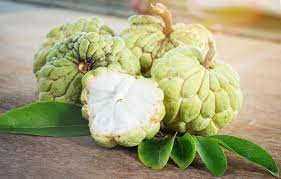
Introduction:
Custard apples are a unique and delicious fruit that are native to tropical regions. They have a creamy texture and a sweet flavor that make them a popular choice for desserts and smoothies. But beyond their taste, many people wonder if custard apples have any health benefits.
In this article, we will explore the potential health benefits of custard apples, including their nutritional content and potential effects on various health conditions.
What Are Custard Apples?
Custard apples, also known as sugar apples or sweetsops, are the fruit of the Annona reticulata tree. The tree is native to tropical regions, including Central and South America, the Caribbean, and parts of Asia and Africa.
The fruit is typically round or heart-shaped and can weigh up to 2 pounds. It has a thick, green skin that is covered in bumps and a creamy white flesh that is divided into segments. Each segment contains a large, black seed that is not edible.
Custard apples are frequently consumed raw or used in smoothies and pastries. They are an excellent source of fiber, potassium, and vitamin C.
Nutritional Benefits of Custard Apples
Custard apples are a good source of several essential vitamins and minerals, including:
Vitamin C:
Custard apples contain about 75% of the recommended daily intake of vitamin C, which is important for immune function, skin health, and wound healing.
Potassium:
A serving of custard apple contains about 20% of the recommended daily intake of potassium, which is important for heart health and blood pressure regulation. Also you can take Tadora 20.
Fiber:
Custard apples are a good source of fiber, which is important for digestive health and may also help reduce the risk of certain chronic diseases.
In addition to these nutrients, custard apples also contain several antioxidants, including flavonoids and carotenoids, which may have potential health benefits.
Health Benefits of Custard Apples
Reduce Inflammation:
Custard apples contain several compounds that have been shown to have anti-inflammatory effects, including flavonoids and tannins. These substances may aid in lowering inflammatory responses in the body and the risk of chronic illnesses including cancer and heart disease.
May Improve Digestive Health:
The fiber content in custard apples may help promote digestive health by preventing constipation and maintaining regular bowel movements. Additionally, custard apples contain several compounds that may help reduce inflammation in the gut and Vidalista 40 can lower the risk of inflammatory bowel disease.
Lower Blood Pressure:
Potassium is an important mineral for regulating blood pressure, and custard apples are a good source of this nutrient. Several studies have found that increasing potassium intake may help lower blood pressure and reduce the risk of heart disease.
Anti-Cancer Properties:
Some studies have suggested that the compounds found in custard apples may have potential anti-cancer properties. For example, one study found that a compound in custard apples called annonacin was able to induce cell death in breast cancer cells.
Frequently Asked Questions
Q: Are custard apples high in sugar? A: While custard apples do contain natural sugars, they are not considered to be high in sugar. A 100-gram serving of custard apple contains about 16 grams of sugar, which is comparable to other fruits like bananas and apples.
